Ocpi Toolkit
Open Charge Point Interface (OCPI) java / kotlin library
Usage
Server (CPO or eMSP)
Examples:
- Http4kTransportServer:
TransportServerimplementation example - PlatformMongoRepository:
PlatformRepositoryimplementation example - VersionsCacheRepository:
VersionsRepositoryimplementation example - VersionDetailsCacheRepository:
VersionsDetailsRepositoryimplementation example
Common code (CPO / eMSP):
// Http4kTransportServer is an implementation of TransportServer using htt4k. You have to code your own implementation.
// It defines the HTTP server, and how to handle requests.
// You can see an example in the list above
val server = Http4kTransportServer(
baseUrl = config.baseUrl, // Example: http://localhost:8080, only used for pagination
port = config.port // Example: 8080, used to know on which port the server will run
)
// PlatformMongoRepository is an implementation of PlatformRepository using mongo
// It will be used to store information about platforms with whom the server is communicating:
// A platform has: Tokens (A, B, C), Endpoints, Versions
// You can see an example in the list above
val platformRepository = PlatformMongoRepository(
collection = mongoDatabase.getCollection<Location>(config.platformCollection)
)
// VersionsCacheRepository is an implementation of VersionsRepository
// It defines which OCPI version the server support, and the endpoints associated with it
// You can see an example in the list above
val versionsRepository = VersionsCacheRepository()
// VersionDetailsCacheRepository is an implementation of VersionDetailRepository
// It defines the available modules (and their endpoint) for the given version
// You can see an example in the list above
val versionDetailsRepository = VersionDetailsCacheRepository()
// Required: defines /versions endpoint
VersionsServer(
transportServer = server,
platformRepository = platformRepository,
validationService = VersionsValidationService(
repository = versionsRepository
)
)
// Required: defines /2.1.1, /2.2.1, whatever version endpoint
VersionDetailsServer(
transportServer = server,
platformRepository = platformRepository,
validationService = VersionDetailsValidationService(
repository = versionDetailsRepository
)
)
// Required: defines /{version}/credentials endpoint for any client to register following OCPI protocol
CredentialsServer(
transportServer = server,
service = CredentialsServerService(
platformRepository = platformRepository,
serverBusinessDetails = cpoBusinessDetails,
serverPartyId = cpoPartyId,
serverCountryCode = cpoCountryCode,
transportClientBuilder = Http4kTransportClientBuilder(),
serverVersionsUrl = versionsUrl
)
)
CPO code:
// LocationsCpoMongoService is an implementation of LocationsCpoService
// Used to know how to retrieve locations
val locationsService = LocationsCpoMongoService()
// Defines /{version}/locations endpoint for any registered client to retrieve locations
LocationsCpoServer(
transportServer = server,
service = LocationsCpoValidationService(
service = locationsService
),
platformRepository = platformRepository
)
// Once that all the modules are defined, you need to start the server
server.start()
eMSP code:
// LocationsEmspMongoService is an implementation of LocationsEmspService
// Used to know how to read / create / update / delete locations
val locationsService = LocationsEmspMongoService()
// Defines /{version}/locations endpoint for any registered client to retrieve locations (and also create / update /
// delete)
LocationsEmspServer(
transportServer = server,
service = LocationsEmspValidationService(
service = LocationsApiClient(
channel = chargingInfrastructureChannel
)
),
platformRepository = platformRepository
)
// Once that all the modules are defined, you need to start the server
server.start()
Optional arguments
It is possible to change the default path of a module using basePath argument:
LocationsEmspServer(
transportServer = server,
service = service,
platformRepository = platformRepository,
basePath = "/2.1.1/cpo/locations"
)
Make sure that VersionDetailsRepository points to the right endpoint (in that case /2.1.1/cpo/locations)
for the locations module.
Client
Examples:
- Http4kTransportClient:
TransportClientimplementation example - Http4kTransportClientBuilder:
TransportClientBuilderimplementation example
Note: Since you need to register to communicate with a server (CPO or eMSP), to use the client, you must have a server defined with version & versionDetails modules. During registration, the receiver will make requests to these endpoints to retrieve the latest available version between the two servers. Note that if you strictly follow the OCPI protocol, you must also have a credentials module set. We don’t enforce that in the lib.
Common (registration)
// sender: the one that wants to register
// receiver: the one that receives the registration request
// PlatformMongoRepository is an implementation of PlatformRepository using mongo
// It will be used to store information about platforms with whom the client is communicating:
// A platform has: Tokens (A, B, C), Endpoints, Versions
// You can see an example in the list above
val senderPlatformRepository = PlatformMongoRepository(
collection = mongoDatabase.getCollection<Location>(config.platformCollection)
)
// VersionsCacheRepository is an implementation of VersionsRepository
// It defines which OCPI version the client supports, and the endpoints associated with it
// You can see an example in the list above
val senderVersionsRepository = VersionsCacheRepository()
// Will be sent during registration for the receiver to use to request what versions the sender supports
val senderVersionsEndpoint = "https://sender.com/versions"
// Will be the first endpoint used by the sender to perform the registration process:
// - First it retrieves the available versions, it picks the latest
// - Then it retrieves the details of that version
// - Finally it requests a registration on the credentials module of the receiver
val receiverVersionsEndpoint = "https://receiver.com/versions"
// Http4kTransportClientBuilder is used to build a transport client during runtime to make all the
// registration process for you. You can do everything manually, but it's recommended to use CredentialsClientService.
val credentialsClientService = CredentialsClientService(
clientVersionsEndpointUrl = senderVersionsEndpint,
clientPlatformRepository = senderPlatformRepository,
clientVersionsRepository = senderVersionsRepository,
clientBusinessDetails = BusinessDetails(name = "Sender", website = null, logo = null),
clientPartyId = "ABC",
clientCountryCode = "FR",
serverVersionsEndpointUrl = receiverVersionsEndpoint,
transportClientBuilder = Http4kTransportClientBuilder()
)
credentialsClientService.register()
Communicating with an eMSP
// Now that the CPO is registered with the eMSP, all the information (tokens & endpoints) is stored in
// platformRepository. It is now possible to access the locations module of the eMSP using LocationsCpoClient.
val locationsCpoClient = LocationsCpoClient(
transportClientBuilder = Http4kTransportClientBuilder(),
serverVersionsEndpointUrl = "https://emsp.com/versions", // Used as ID for the platform (to retrieve information)
platformRepository = platformRepository
)
// Example on how to get a specific location
locationsCpoClient.getLocation(countryCode = "fr", partyId = "abc", locationId = "location1")
Communicating with a CPO
// Now that the eMSP is registered with the CPO, all the information (tokens & endpoints) is stored in
// platformRepository. It is now possible to access the locations module of the CPO using LocationsEmspClient.
val locationsEmspClient = LocationsEmspClient(
transportClientBuilder = Http4kTransportClientBuilder(),
serverVersionsEndpointUrl = "https://cpo.com/versions",
platformRepository = platformRepository
)
// Example on how to get a specific location
locationsEmspClient.getLocation(locationId = "location1")
Differences
ocpi-lib-2.1.1 -> ocpi-lib-2.2.1
Also see:
- OCPI 2.1.1 -> OCPI 2.2 -> OCPI 2.2.1: official doc
What actually changed in the lib:
| Module | Changements |
|---|---|
| Common | – Added hub exceptions- Added CiString type |
| Versions | – Added V_2_2 and V_2_2_1 in VersionNumber enum- Added role in Endpoint |
| Credentials | – Credentials object has a list of CredentialRoles instead of only business_details, party_id & country_code. Also added CredentialsRoleRepository for the user to specify the roles of the platform they are implementing. In 2.1.1, the user had to pass business_details, party_id, country_code to CredentialsClientService and CredentialsServerService. |
| Locations | – Too many changements, see this commit for details |
ocpi-lib-2.1.1 -> ocpi-lib-2.1.1-gireve
| Module | Changements |
|---|---|
| Common | nothing changed |
| Versions | – Removed V_2_0 and V_2_1 in VersionNumber enum |
| Credentials | – Removed PUT (the user has to first delete() then register() to update (so token A has to be exchanged outside OCPI protocol between delete and register) |
| Locations | – evse_id is now required (added doc to explain that in Locations object) |


